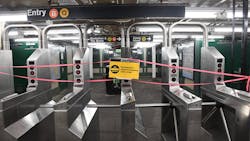New York MTA to see partial restoration of night service next week
Starting Monday, Feb. 22, the Metropolitan Transportation Authority (MTA) will run an extra two hours every night; extending service to 2:00 a.m. and reopening at 4:00 a.m. The changes are being implemented due to several factors including MTA’s continued cleaning and sanitization efforts, customer confidence in the safety of the system and New York State’s improving COVID-19 trends.
Hospitalization and infection rates related to COVID-19 have decreased and New York Gov. Andrew Cuomo announced last week that stadiums and areas with a capacity of 10,000 people or more could begin to re-open with limited spectators on Feb. 23.
"With the expansion of hours of operation for restaurants and bars, as well as the re-opening of cultural centers and sports facilities, we must ensure that both employees and patrons have transportation options to get them where they need to go, when they need to get there,” said Gov. Cuomo. “Accordingly, the MTA will be expanding the overnight hours for subway service to ensure transportation is available, while still maintaining the organization's comprehensive cleaning procedures."
The Federal Transit Administration, Centers for Disease Control and Prevention and U.S. Environmental Protection Agency’s Office of Research and Development all advise cleaning and disinfection, especially high-touch surfaces.
"The partial late-night reopening of the subways will support the governor's gradual reopening as we are seeing positive trends with the deployment of the vaccine, lower infection rate, the resumption of indoor dining and extended hours for bars and restaurants. The suspension of service for two hours will enable the MTA to continue the most aggressive cleaning and disinfecting regimen that has led the subway to be the cleanest it has ever been,” said MTA Chairman and CEO Patrick J. Foye.
MTA has stopped subway service nightly between 1:00 a.m. and 5:00 a.m. since May 6, 2020, to allow for daily deep cleaning. At the time of the closure announcement, MTA said it would resume overnight service when “customer demand returns, and innovative and efficient disinfecting techniques have been successfully deployed systemwide.”
MTA has piloted disinfecting entire train sets using ultraviolet technology, implemented the use of electrostatic guns and fogger machines and selected eight companies through the Transit Innovation Partnership to deploy products and technology on MTA’s system to see how they enhance safety during the pandemic. MTA frontline workers also began receiving COVID-19 vaccinations in mid-January.
On the rider side, Gov. Cuomo’s office points to a recent survey by Hofstra University published in January 2021 that found three out of four riders felt safer riding the subway as a result of COVID cleaning. A survey conducted by MTA last fall delivered similar results with more than 75 percent of customers agreeing that cleaning and disinfecting made them feel safe when using transit.
About the Author

Mischa Wanek-Libman
Group Editorial Director
Mischa Wanek-Libman is director of communications with Transdev North America. She has more than 20 years of experience working in the transportation industry covering construction projects, engineering challenges, transit and rail operations and best practices.
Wanek-Libman has held top editorial positions at freight rail and public transportation business-to-business publications including as editor-in-chief and editorial director of Mass Transit from 2018-2024. She has been recognized for editorial excellence through her individual work, as well as for collaborative content.
She is an active member of the American Public Transportation Association's Marketing and Communications Committee and served 14 years as a Board Observer on the National Railroad Construction and Maintenance Association (NRC) Board of Directors.
She is a graduate of Drake University in Des Moines, Iowa, where she earned a Bachelor of Arts degree in Journalism and Mass Communication.
